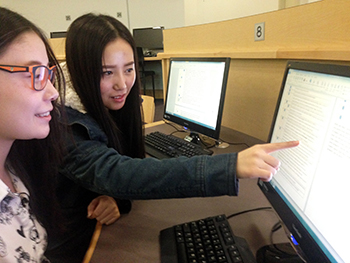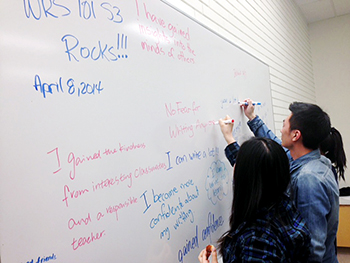Seven years ago, the University of Alberta's interdisciplinary Writing Task Force piloted the first writing studies program in the country to also use 'writing theory and research' as subject matter.
The initial version of this course - dubbed Writing Studies 101: Exploring Writing -had just two sections its first semester and a host of critics concerned that a Writing About Writing (WAW) approach would lack cross-faculty appeal.
Now, WRS 101 offers 23 sections to more than 400 UAlberta students each year and the unique program has received international acclaim for its innovative approach and dedicated instructors.
The Conference on College Composition and Communication (CCCC) - considered the world's leading organization for writing studies - has awarded WRS 101 the coveted Writing Program Certificate of Excellence for 2014-15. 
The University of Alberta was the only Canadian institution honoured this year and becomes the second ever to be recognized by the CCCC, along with the University of Toronto.
"For the program to receive this prestigious award from the CCCC, it shows Writing Studies 101 is something very precious that the U of A should be very proud of," says past-director of Writing Studies 101 and Department of English and Film Studies professor Elizabeth Sargent. "It is also a testament to the wonderful instructors who teach Writing Studies 101."
Housed within the Faculty of Arts' Office of Interdisciplinary Studies, WRS 101 is a blended course, with a mix of online and in-class components. It's taught by instructors who train with the U of A's Centre for Writers (C4W), and it collaborates with the University's Bridging Program (BP) and English Language Program (EPL) to offer courses for international and ESL students.
The innovative course is open to all undergraduate students at the University of Alberta.
Sargent, who sat on the University's Writing Task Force, says it helps students in all disciplines gain the knowledge and experience they need to produce university-level writing.
"We discovered one of the major concerns in designing first-year writing courses is the issue of knowledge transfer," she explains. "Students weren't really becoming consciously reflective --often they didn't transfer anything to their subsequent courses or to the workplace."
The Writing Task Force brainstormed ideas for a course that could teach students how to tackle academic writing, and carry those skills forward into their careers.
WRS 101: Exploring Writing was born of those discussions, says Sargent.
Current Writing Studies 101 instructor and coordinator Jon Gordon says most writing courses typically offer a "placeholder" topic as subject matter - usually considered inconsequential to the learning process.
"For example, a writing course might use the topic of zombies to teach essay writing - what we realized is students were actually learning more about zombies than they were learning about the writing process," says Gordon. "That's why the Writing About Writing (WAW) approach is fundamental to the success of this course."
It was also clear to instructors, long before the implementation of Writing Studies 101, that most students do not arrive at university equipped with the writing skills necessary to navigate the world of academia, adds Sargent.
"There is a significant amount of research, scholarship and theory in the field of writing, and our students have the right to be exposed to this subject matter," she says. "They learn not to procrastinate, they learn strategies for generating ideas, how to read and respond to writing, they read research on revision and different stages of the writing process - and then they write about that material."
Enrolment numbers for the course have increased exponentially over the last seven years, with almost half of the current sections now funded by and reserved exclusively for the UAlberta Bridging Program.
In fact, Sargent says demand for WRS 101 has become greater than the program can accommodate, and some interested students are forced to wait until their second, third and even fourth year to be accepted.
"The open sections fill up within 24 hours of being posted, and there is often a long wait-list," says Sargent, adding she's hoping the recent CCCC award can highlight the need for increased funding for additional tutors and sections. "It's clear there is student demand for it and the university should continue to do its best to support it and build on it."
 Writing Studies 101: Exploring Writing is accepted as 3 credits of students' writing/English requirement across every faculty at the U of A.
Writing Studies 101: Exploring Writing is accepted as 3 credits of students' writing/English requirement across every faculty at the U of A.
According to officials, multiple UAlberta faculties have recently proposed dedicated sections for their students, and stakeholders are busy exploring funding options.
For more information on the interactive course, which boasts small class sizes and one-on-one sessions with tutors, visit http://www.ois.ualberta.ca/WritingStudies.
The 2014-15 Writing Program Certificate of Excellence award will be officially presented in March 2015 at the CCCC's annual conference in Tampa, Florida. For more information on the CCCC and to view past and present award recipients, visit http://www.ncte.org/cccc/awards/writingprogramcert.